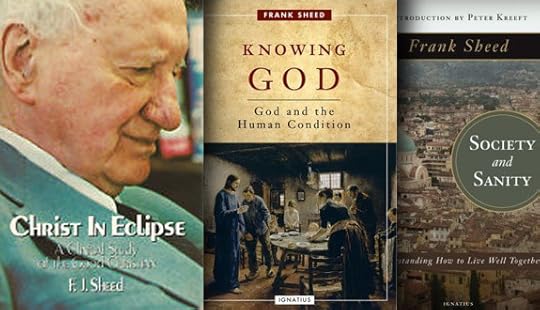A Man Obsessed With Sanity

A Man Obsessed With Sanity | CWR
Author and apologist Frank Sheed, once introduced as "Aquinas in a Collar and Tie", was a master of precision and clarity
This is the second and final part of an interview with Dr. Joseph F. Martin, professor of Communication and Rhetoric at Hampton University in Virginia, about author, apologist, and publisher Frank Sheed (1897-1981). (Part one, "The Evangelistic Brilliance of Frank Sheed", was published on Sunday, February 9th.) Dr. Martin is the former art director of re:generation quarterly and his artwork has been commissioned by numerous national clients. He has also written essays and reviews for Word, Books and Culture, and other publications. In 2012, Martin was awarded his doctorate from Regent University, receiving honors for his dissertation, “Lingua Franka: An Examination of the Frank Sheed's Rhetorical Achievement”, which examined closely the unique qualities Sheed employed as speaker, apologist, author, and communicator.
The first part of this interview focuses on how Sheed helped Martin (a former Evangelical) journey into the Catholic Church, Sheed's background, Sheed's skills as a communicator, and what distinguished Sheed as an apologist. This second part examines Sheed's focus on “sanity”, compares him to G. K. Chesterton and C. S. Lewis, and highlight his key books.
CWR: Sheed once said that he was “obsessed with sanity”. What did he mean by that? How did he go about articulating this obsession?
Martin: Sheed’s apologetic anthem was animated by a counter-rhetoric of Christian Realism, one he grounded in a bass line of “Sanity.” With the onset of modernity Christians were faced with the accusation they dealt in an unreal idealism – pie-in-the-sky sentimentalism, versus real life. Sheed cried “foul”, turning the charge on its head. Christian Faith isn't escapism: it provides the one alternative that conveys a convincing narrative. And it is the Catholic Church, he maintained, despite centuries of hypocrisies and failings, that remains the custodian of the Christian Gospel, and is thus the rightful home of the “honest lover of truth.”
“Nothing is rightly seen save in the totality to which it belongs; no part of the universe is rightly seen save in relation to the whole,” Sheed explained. “But the universe cannot be seen as a whole unless one sees God as the source of the existence of every part of it… The man who does not see God may have vast knowledge of this or that section of being, but he is like a man who should know all about the eye never having seen a face. His knowledge is of items in a list, not of features in a face. The shape of things, the proportion of things, the totality of things, are unseen by him, indeed unsuspected by him.”
It was this “shape and totality” of things to which Sheed gave his life to understanding and unfolding. His entire apologetic was what G. K. Chesterton called “The Outline of Sanity.” Theology and Sanity came out in 1946, and seven years later another book called Society and Sanity, “but before writing the first of them I had been – so to speak –obsessed with sanity.” In The Church & I, Sheed concluded, “[Sanity] has been the key to all my lecturing, it at is the center of the ‘I’ who is half of this book’s title, the ‘I’ whose experience of the Church the book records.
Friends of mine, who had not read either [book]—friends don’t—were a little concerned for my mental state…They assumed I was writing about insanity—who writes whole books about sanity? I do. … By sanity I mean seeing what’s there. Who doesn’t? you ask. Who does? I answer.
I think Theology and Sanity deserves wider recognition as a minor Christian classic. Sheed’s prose achievement scores. To engage in some cross-confessional borrowing of lines (from J.I. Packer’s description of Richard Baxter’s The Reformed Pastor), Sheed’s words there “have hands and feet. They climb all over you. They work their way into your conscience.” The lover of words suffused his book’s doctrinal content with style to make it sing. An example is his explanation of the place of reason in belief. Remarking on “the extraordinary compliment that the Vatican Council paid to human reason in the year 1870,” he writes:
It defined that the existence of God can be known by the human reason without the aid of revelation. This is the mightiest compliment ever paid the human reason, and it is of faith.…What the Vatican Council put in its carefully measured words, the Holy Spirit had said a good deal more abruptly three thousand years before – ‘The fool hath said in his heart, there is no God.’ Both, as you see, come to the same thing, that the existence of God can be known by reason; therefore if you do not know it, your reasoning is defective, suggests the Vatican Council; you are a fool, cries the Psalmist under the inspiration of God.
And diffusing the most commonly heard argument from atheists, Sheed squared the case with these words:
Carl E. Olson's Blog
- Carl E. Olson's profile
- 20 followers



